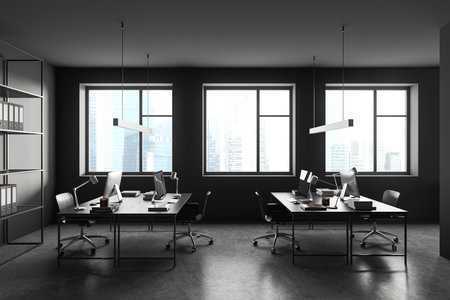Introduction: Startup Growth and Workspace Design in India
Indias vibrant startup ecosystem has undergone an unprecedented transformation in the last decade, with cities like Bengaluru, Mumbai, and Gurgaon emerging as major innovation hubs. This dynamic growth is not only fueling economic progress but also reshaping the way office spaces are conceived and utilized. As Indian startups compete on a global stage, their approach to workspace design reflects a fusion of indigenous cultural values, such as community and flexibility, with modern trends that prioritize productivity and well-being. From open-plan layouts inspired by collaborative working to the integration of traditional motifs and sustainable materials, these offices are more than just places to work—they embody the ambitions and ethos of a new generation of Indian entrepreneurs. In this article, we delve into case studies of top Indian startups whose productivity-driven office interiors illustrate how the interplay between local identity and global aspirations is redefining workplace culture across the country.
Reflecting Indian Identity in Office Designs
India’s top startups are increasingly shaping their office interiors to echo the nation’s vibrant culture and deep-rooted traditions. These productivity-driven workspaces go beyond aesthetics, integrating indigenous elements that foster a sense of belonging and promote team bonding. By blending local motifs, colors, and community-centric layouts, companies create environments where employees feel connected not only to their work but also to their cultural heritage.
Fusion of Indigenous Colors and Motifs
Startups like Swiggy, Byju’s, and Zomato have embraced color palettes inspired by traditional Indian art forms such as Madhubani, Warli, and Kalamkari. These lively hues energize the workspace and invoke a sense of pride in India’s artistic legacy. Offices often feature wall murals or accent walls adorned with folk patterns or regional symbols, seamlessly weaving culture into daily work life.
| Startup Name | Indigenous Colors Used | Motifs/Patterns Integrated |
|---|---|---|
| Swiggy | Saffron Orange, Indigo Blue | Street Food Art, Truck Art Patterns |
| Zomato | Crimson Red, Turmeric Yellow | Madhubani & Local City Landmarks |
| Byju’s | Royal Blue, Deep Green | Kalamkari Borders, Geometric Mandalas |
Collaborative Community Spaces Inspired by Indian Traditions
The concept of ‘adda’ (informal gathering spaces) is reimagined within modern offices. Startups often dedicate zones for casual meetings modeled after Indian courtyards or ‘choupals’, encouraging spontaneous discussions and teamwork. Flexible seating like jhoolas (swings) or floor cushions reflects the Indian love for informal socializing. Many workplaces also celebrate festivals together in communal areas decorated with rangoli or floral garlands—strengthening employee relationships through shared cultural experiences.
The Impact: Boosting Productivity and Team Bonding
This thoughtful design approach does more than beautify the office—it cultivates an inclusive atmosphere where every team member feels valued. Employees are inspired by familiar visuals and shared traditions, leading to increased motivation and a sense of unity. By embedding Indian identity into every corner of their offices, these startups demonstrate that honoring local culture can be a catalyst for productivity and innovation.

3. Flexible Workspaces: Adapting to Diverse Indian Workstyles
The dynamic growth of Indian startups has brought about a fresh perspective on how office interiors can fuel productivity. A key trend observed in top Indian startup offices is the adoption of flexible workspaces that adapt to the diverse workstyles found across the country. Multipurpose zones have become essential, offering employees the freedom to collaborate, brainstorm, or focus individually as per their immediate requirements. These spaces often double up as informal lounges, quick meeting spots, or even meditation corners, reflecting India’s unique blend of modernity and tradition.
Multipurpose Zones for Enhanced Collaboration
In cities like Bengaluru and Gurgaon, startups are reimagining office layouts with zones that seamlessly transition between uses throughout the day. For example, a cafeteria might turn into a town hall space or a training room post-lunch hours. This approach not only optimizes real estate costs but also encourages spontaneous interactions—a hallmark of Indian work culture where teamwork and community play a central role.
Hot Desking: Supporting Hybrid Work Trends
As hybrid work models gain traction across India, hot desking has emerged as a practical solution in startup environments. Employees no longer have fixed desks; instead, they choose their spot each day based on their tasks and mood. This flexibility caters to the diverse needs of software engineers, creative teams, and sales professionals alike, while also supporting remote work policies popular among millennial and Gen Z workers in India’s tech hubs.
Inclusive Facilities for All Professionals
Recognising the diversity among Indian professionals—across languages, regions, and abilities—top startups are integrating inclusive facilities into their office design. Prayer rooms cater to spiritual needs, wellness zones provide a respite from urban stress, and gender-neutral restrooms reflect progressive values. By prioritising inclusivity alongside flexibility, these offices create an environment where every employee feels respected and empowered to do their best work.
4. Tech Integration and Smart Solutions
India’s top startups are setting benchmarks by seamlessly integrating cutting-edge technology into their office interiors, ensuring enhanced productivity and fostering a culture of innovation. From Bengaluru to Gurugram, modern workspaces are embracing digital transformation, reflecting the tech-savvy spirit of Indian entrepreneurship.
IoT-Enabled Workstations
IoT (Internet of Things) is transforming how employees interact with their work environment. Many leading startups deploy IoT-enabled desks that automatically adjust lighting, temperature, and even ergonomic seating preferences as soon as an employee checks in. This not only boosts comfort but also optimises energy usage, directly impacting productivity.
| Feature | Benefit for Startups | Popular Brands/Examples |
|---|---|---|
| Smart Desks & Sensors | Personalised settings, improved wellbeing | Zoho, Swiggy offices |
| Energy Management Systems | Lower costs, sustainability focus | Zerodha HQ, Razorpay workspace |
| Automated Access Control | Smooth entry, enhanced security | Freshworks Chennai campus |
Seamless Video Conferencing & Collaboration Tools
The rise of hybrid work culture in India has made seamless video conferencing a must-have. Startups invest in state-of-the-art AV setups with soundproof pods and high-speed internet to facilitate uninterrupted communication across geographies—be it with team members in Hyderabad or clients abroad. Collaboration tools like Microsoft Teams and Slack are deeply integrated into daily workflows, making teamwork more efficient than ever.
Impact on Productivity and Innovation
- Real-time Connectivity: Ensures quick decision-making, reducing project turnaround time.
- Remote Access: Enables talent from tier-2 cities to contribute without location constraints—a uniquely Indian advantage.
- Data-Driven Insights: Smart analytics help leaders optimise floor usage and resource allocation based on actual work patterns.
Cultural Relevance: Made-for-India Solutions
What truly sets Indian startups apart is their adaptation of global tech trends to local needs—like power backup for video calls during monsoons or touchless attendance systems considering local hygiene practices. These smart solutions ensure that technology serves as an enabler, supporting both productivity and the innovative spirit that defines India’s startup ecosystem.
5. Promoting Wellbeing and Sustainability
Eco-Friendly Materials for the Indian Context
Top Indian startups are increasingly choosing eco-friendly materials to align with both global sustainability goals and local values. From upcycled furniture sourced from Jaipur artisans to VOC-free paints and bamboo partitions, these choices resonate with the environmentally conscious mindset of India’s millennial and Gen Z workforce. Such materials not only reduce the carbon footprint but also create a unique “desi” identity within modern workspaces.
Biophilic Design: Bringing Nature Indoors
Many productivity-driven office interiors now integrate biophilic design elements, such as vertical gardens, indoor plants, and open courtyards reminiscent of traditional Indian homes. Startups in Bengaluru and Hyderabad often feature lush green zones that foster relaxation, reduce stress, and improve indoor air quality—factors highly valued by young urban professionals seeking harmony between work and nature.
Recreation Zones: Balancing Work and Play
The emphasis on work-life balance is shaping office layouts with dedicated recreation zones. From game rooms featuring carrom boards and table tennis to yoga decks and nap pods, these spaces cater specifically to the preferences of Indian millennials who value holistic wellbeing. Companies like Swiggy and BYJU’S have set industry benchmarks by providing vibrant breakout areas where teams can unwind, bond, and recharge.
Wellness Initiatives: Supporting Mental and Physical Health
Progressive startups are taking employee wellness to the next level by launching initiatives like onsite health check-ups, meditation sessions, flexible working hours, and ergonomic workstations. These programs reflect a shift in workplace culture where employee happiness is seen as directly linked to productivity—a value deeply ingrained in contemporary Indian startup ecosystems.
Catering to Millennial & Gen Z Expectations
The demand for sustainable practices and wellbeing-centric interiors is being driven by India’s younger generations who expect their workplaces to reflect their social consciousness. By adopting green certifications (such as IGBC or LEED), promoting healthy living, and fostering a sense of community through thoughtful design, top startups are positioning themselves as employers of choice for India’s brightest talents.
6. Case Examples: Spotlight on Leading Indian Startups
Zomato: Culinary-Inspired Collaboration Spaces
Zomato, one of India’s most successful food-tech unicorns, has created an office space that mirrors its brand ethos—dynamic, youthful, and collaborative. The interiors are inspired by culinary themes, with open kitchens, informal dining zones, and vibrant cafeteria-style seating. These elements encourage team members to interact informally and brainstorm ideas over a meal. Zomato’s workspace design also features flexible meeting pods and breakout areas, fostering creativity while supporting agile work methods typical in Indian startup culture.
Swiggy: Agile Zones for Rapid Innovation
Swiggy’s Bengaluru headquarters showcases an employee-centric approach rooted in the values of flexibility and well-being. The office boasts modular workstations and movable walls to support different project needs, reflecting India’s fast-paced startup environment. Recreational lounges, indoor gaming corners, and biophilic elements such as indoor plants contribute to a relaxed yet productive atmosphere. Swiggy encourages cross-team collaboration through communal seating arrangements and tech-enabled meeting rooms—key factors driving their rapid innovation in India’s competitive food delivery space.
BYJU’S: Learning-Focused Design for Continuous Growth
As a leader in EdTech, BYJU’S has crafted interiors that promote learning at every turn. Their offices integrate classroom-inspired breakout areas, soundproofed focus zones, and digital boards for spontaneous discussions. Open libraries and reading nooks reflect BYJU’S educational mission while supporting employee upskilling—a value deeply respected in Indian corporate culture. Natural light floods the workspace, boosting morale and productivity. Interactive walls adorned with student success stories further motivate teams to deliver impactful work for learners across India.
Key Takeaways from Indian Startup Offices
The common thread running through these case studies is a deep understanding of local work habits and cultural values. Whether it’s Zomato’s food-centric collaboration, Swiggy’s agile zones, or BYJU’S focus on continuous learning, top Indian startups have reimagined office design to drive productivity while resonating with their teams’ aspirations and lifestyles.
7. Key Takeaways for Indian Entrepreneurs
Actionable Insights from Top Startups
Drawing inspiration from leading Indian startups, it’s clear that productivity-driven office interiors are a blend of thoughtful design, cultural relevance, and employee well-being. Flexible layouts, ergonomic furniture, and technology integration enhance efficiency while open collaboration zones foster teamwork. Ensuring natural light and adding biophilic elements like indoor plants not only boost creativity but also reflect India’s connection to nature.
Locally-Inspired Strategies
Embrace Indian Aesthetics
Infuse offices with vibrant local art, traditional motifs, or regional handicrafts to celebrate India’s heritage and create a sense of belonging. Use colours inspired by Indian festivals—think saffron, indigo, or green—for energy and positivity.
Prioritise Wellness and Flexibility
Offer spaces for meditation or yoga breaks, reflecting India’s holistic wellness culture. Flexible workstations accommodate diverse work styles, from collaborative ‘adda’ areas to private focus pods.
Community and Collaboration
Create breakout spaces that encourage ‘chai pe charcha’ (conversations over tea), reinforcing informal knowledge sharing—a hallmark of successful Indian startups.
Implementation Tips
- Involve employees in the design process to ensure the space resonates with your team’s values.
- Balance global best practices with local context—blend modern functionality with traditional warmth.
- Use sustainable materials sourced locally to support eco-friendly operations and the community.
Conclusion
A truly productive office in India respects both international standards and indigenous sensibilities. By combining smart layouts, cultural touchpoints, and wellness-driven features, entrepreneurs can create inspiring workspaces that attract talent and drive innovation in the uniquely vibrant Indian startup landscape.

